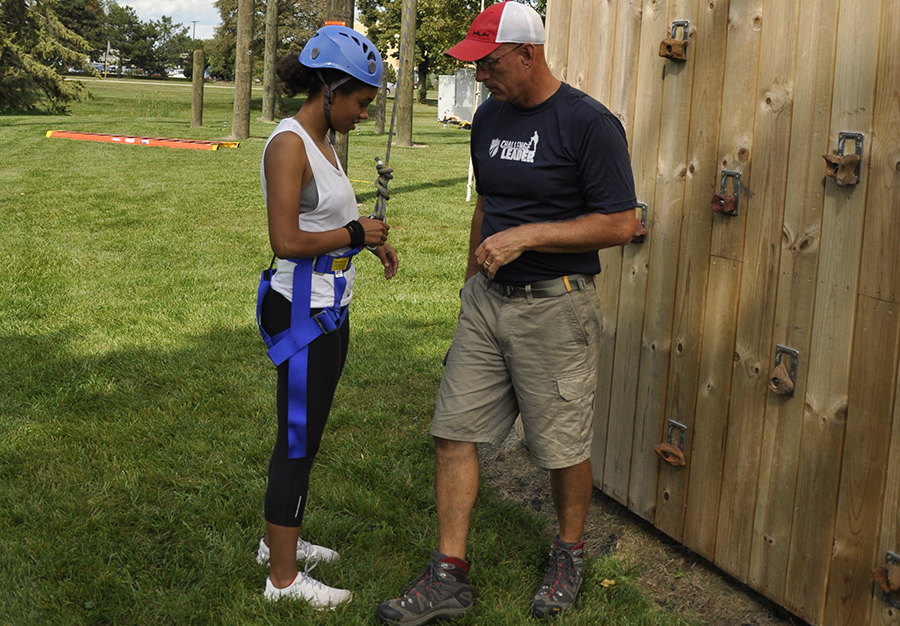Madison College’s Jeff Messer finds his balance in outdoor environments
Jeff Messer, right, the Madison College Challenge Course Coordinator, shows student Lucy Smith how to properly attach her harness to the safety rope at the climbing wall. Messer works with groups of students, staff and guests who use the college’s outdoor challenge course to expand their learning experiences.
September 13, 2017
Jeff Messer points to the zip line — a dizzying drop into thin air from a platform in the sky — and likens it to the first steps that a new college graduate takes down the path toward their future.
“You’ve gone through the entire program, that’s your entire college career. Now, you’re ready to take that first step from college — out into the real world,” he said.
“Stepping off the zip line — and look at all the things you had to do to get to that point. All the different skills, all the different obstacles that you had to overcome. Now, here you are. Graduation day is today, and you have to take the next step. Once you take that step, it can be really scary for some, but now you can use the skills that we (at the Challenge Course) have helped you recognize that you always had.”
As a man with extensive experiences in a wide range of learning environments, Jeff Messer, the current Challenge Course Coordinator, has found balance in the many aspects of his life — not just on the high ropes of Madison College’s challenge course.
Born and raised in Beloit, he spent the first 8 years of his education in a Catholic grade school. It was a formative experience, largely because it showed Messer what didn’t work for him.
“When I first went there, they had nuns. The nuns had rulers,” laughing, Messer said, “you can draw your own conclusions.” He went on to explain how this experience fueled his belief that not everyone learns well in a sedentary, cloistered classroom environment. It also gave Messer “this idea that there are distinct personalities and learning types. And [that] sitting quietly in a room, in a very organized, structured environment, was not the best way for [him] to learn.”
Messer learned that his preferred learning style was working with his hands. With that in mind Messer spent several years after high school working in a local factory before leaving to pursue his Associate’s Degree in General Education at the University of Wisconsin Marshfield extension school. It was his years in Marshfield, and the summer vacations spent working for the Wisconsin Conservation Corps, that taught Messer the unique value of working and learning outdoors.
“Inside, it’s very structured. Outside, there’s time for interaction. It seems like at the end of the day, after working outside, you can really see the difference you’ve made.”
Working for the Wisconsin Conservation Corps, Messer spent his summers building bridges, fish shocking, and systematically clearing invasive boxwood trees from budding oak savannahs. At the end of his time with the Conservation Corps, Messer received a $1,500 scholarship toward higher education. With this in pocket, he was able to attend University of Wisconsin Stevens Point for Resource Management.
While at Steven’s Point, Messer led multiple expeditions for high schoolers with learning challenges as a camp counselor for the Central Wisconsin Environmental Station. This was the perfect opportunity for Messer to use his knowledge about alternative learning styles and the benefits of being outdoors. He described taking the kids canoeing up in the Boundary Waters, and how being in nature — balancing acquiring new skills with hands-on experience — helped the students focus on themselves. “We were focusing on skills that we had, and improving skills that we didn’t have,” said Messer. “There were very tangible consequences and results.”
After graduation, Messer took a job with the State of Wisconsin Juvenile Correction Facilities SPRITE Program, an adventure based education program. In this position, Messer continued to push the boundaries between self-knowledge and outdoor recreation to new heights through the month-long programs he led for incarcerated youths. During these trips, Messer led a group of 12 youths into the wilderness for 25-28 days. While the physical environment was undeniably demanding, Messer describes the program as having introduced fundamental stability into the lives of individuals who had rarely been able to rely on anything. In addition to guaranteed food and shelter, the program offered an introduction to leadership and team-building skills that might otherwise have been inaccessible to the youths in the detention centers. When each month came to a close, Messer introduced his participants to the second half of the experience—the Urban Reintegration Program, run by Jeff Gibbons.
After 17 years with SPRITE, Messer was invited by Blackhawk Technical College to become the Coordinator at their newly built Challenge Course. As the first Challenge Course on in Wisconsin history on a technical college campus, the construction of the course itself was a landmark. Due to the closing of General Motors, and Rock County’s deteriorating economy the course closed just five years later.
This turn of events led Messer to found his own company, Incorporating the Invisible, and begin his work as a Challenge Course Consultant and Coordinator. He now spends his time rotating between five different locations, planning activities for groups ranging from college athletes to mid-level management in Fortune 500 companies. Regardless of who’s participating, the activities are all designed to build teamwork—and to help the participants learn about themselves, about the strengths and fallibilities that remain hidden in everyday life.































